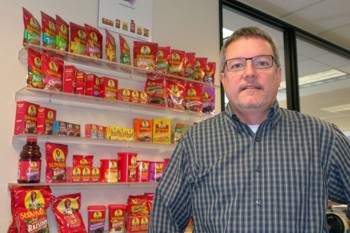Raisin Business is Far From Drying Up
Raisin Business is Far From Drying Up
This is a good time for raisins. From the consumer perspective, they are healthful, convenient, portable, long-lasting, and inexpensive. On the business side, they are sustainable and relatively easy to grow. Their chemical composition and the drying process make them robust and pathogen-resistant. Demand is stable and probably going up as shoppers become more value conscious.
"It's good to be in the food business, and even better to be in healthy food," observes John Slinkard, Vice President of customer and supply chain services at Sun-Maid Growers of California, which has housed customer service and other operations in Hacienda since 1982. "There is so much press on eating healthy," he notes. "We've got a product that is literally 'just grapes and sunshine.' This is something we are very proud of."
Sun-Maid is an agricultural cooperative based in Kingsburg, south of Fresno, owned by close to 1,000 raisin growers in the Central Valley. The 100,000 tons of raisins the coop sells annually represent about 70 percent of its total product volume; the remaining 30 percent is comprised of various dried specialty fruits - apricots, peaches, figs, and prunes, to name a few. Dried cherries and pineapple were recently introduced.
The raisin growers themselves are varied and diversified. Vineyards can range from 10 to 1,000 acres, or more. Whether large or small, most are still family farms. A leading example is the farm owned by Sun-Maid Chairman Jon Marthedal, one of the four generations of his family that has been producing raisins in the same soil for over 100 years.
Unlike other, more weather-sensitive crops, raisins are not "too, too susceptible" to the extremes of Mother Nature, Slinkard reports. Nor are the threats very frequent. "The worst event is a late hard freeze in April or May, after the vines start putting out little grape bunches, but this has only happened a few times in the last 100 years," he says.
Heavy rains in the fall can cause some loss to product drying naturally in the field. To avoid the problem, many growers are switching to vine-drying, converting from the old method of allowing the harvest to dry on paper trays on the vineyard floor. Vine-drying keeps the grapes elevated, and while they are still hanging, Slinkard points out, "as long as it warms up and the sun comes out, they will continue to dry."
The transition to vine-drying is not something that can be done overnight, however. "You can't just convert a 50-year old vineyard. It has to be re-trellised, and there is an upfront cost," he comments. Vine-drying also takes longer - almost a month compared to two to three weeks on the ground - but it offers the advantage of mechanical harvesting, while field-dried grapes are traditionally cut from the canes by hand.
About 50 percent of the coop's raisins are sold in the familiar red Sun-Maid package. The other 50 percent become ingredients in cereals, breads, cookies, candies, and many other foods. More than a third of Sun-Maid's retail and ingredient products are shipped to international markets in more than 50 countries across the globe.
For more information, visit www.sunmaid.com.
Photo: Sun-Maid's John Slinkard with part of the company's extensive product line.
Also in this issue...
- Sanarus Medical Cryoablation Treatment Targets Breast Cancer
- Pacific Coast Title Prepares for Housing Upturn
- Business Bits
- Executive Profile: Robin Trembath, Trembath, Deichler & Hermanson
- Raisin Business is Far From Drying Up
- NCAL Computer Source Combines Service and Technology
- Hacienda Sees Significant Construction, Leasing in 2008: Oracle, Roche Lead the Way
- Toastmasters Imparts Both Communications and Leadership Skills
- FarmShares Encourages Healthy 'Locavore' Eating
- Secret - and Published - Scribes Find Support at Tri-Valley Writers Club
- Hacienda Companies Are Making A Difference!
- Hacienda Index
- Calendar





